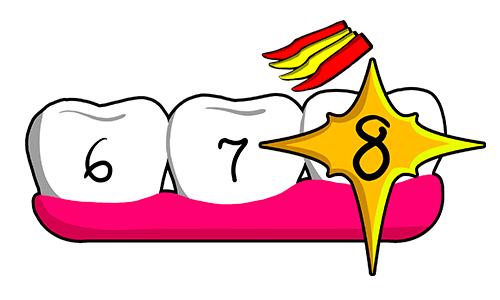
This website is about minimally invasive dentistry. Here, we focus on PRESERVING wisdom teeth, not removing them.
Wisdom teeth, or third molars, are the last teeth that come in during the late teen or early adult years, in the very back of the mouth. If you are here, you probably know this very well already.
There is endless information online about wisdom tooth removals. About how necessary and convenient getting them out is, or what the removal surgery is like, or what the post–operatory period is like.
I am here to offer you something different.
Most dentists and oral surgeons see wisdom teeth as nothing more than a source of problems. A tooth that comes in later in life, harder to access and work on, and that sometimes causes problems? They will usually not give it a second thought. They will only want to remove it.
Again, I am here to offer you something different.
Many also advocate for their removal, often for the removal of all four of them, even when they are perfectly healthy and asymptomatic, for a variety of reasons that I strongly disagree with. Wisdom teeth are also frequently used as scapegoats for all sorts of problems they don't cause, and surrounded by a bunch of myths and misunderstandings.
I am here, my dear reader, to offer you a critical and skeptical point of view about all of this. I can say, with full confidence, that the removal of third molars is a surgery that gets performed excessively, especially in certain countries, including the United States. Just like children used to get their tonsils removed a lot more frequently than necessary, a similar tendency persists regarding wisdom teeth. This is wrong, this needs to change, and I will explain why I believe so here.
When a wisdom tooth causes problems, there are often ways to deal with them in a respectful and minimally invasive way. This is basic: dentists exist to resolve dental problems. Removing a tooth is the last thing we should do. Any dentist would agree on this if we were talking about any other tooth. Wisdom teeth, being teeth like any other, should not be considered any differently. We will also discuss their treatment (extraction aside) here.
By sharing my philosophy, ideas, reflections and experiences, I hope to do my bit to shed some light on the most misunderstood teeth in human dentition. And especially, I hope to help any patient out there make a wise choice regarding their oral health. Feel free to contact me for further insight or even a second opinion on your wisdom teeth. I will be pleased to help you.
The articles published here are not scientific articles: they are opinion articles. They will resemble being in a consultation with me more than reading a scientific journal.
Opinion articles are still an important resource, because dentistry is not only scientific in nature: it is also an art. This is an idea that I love, and that you will see me repeating in every article. In fact, I like comparing dentists with artists. And just like Miguel de Cervantes was not a better writer than William Shakespeare, I assure you, I am not a better dentist than yours. I cannot substitute him or her. And I don't intend to do so. You should be seeing a competent, ethical and minimally invasive dentist in real life. Online opinions cannot replace proper dental care.
However, almost any online resource about wisdom teeth will be invariably about the removal surgery. There is a huge information void concerning the opposite approach. To my knowledge, there is no other dental website, or dentist active online, that offers advice on minimally invasive practices for wisdom teeth, or that focuses on their preservation rather than their removal. So, I hope to provide a valuable point of view. You, dear reader, will determine its value. But its price is free. If you want to help keep this project going, you can make a donation here. In doing so, you will also collaborate with ALS research in Spain.
I know that removing wisdom teeth is sometimes necessary. I am not against their removals. In fact, I remove wisdom teeth myself on a regular basis. Or, if needed, I send my patients to an oral surgeon. But again, this is not what this site is for. You have plenty of other sites out there to get information about that procedure. Similarly, you will not struggle to find a dentist or surgeon that will be happy to remove your wisdom teeth without a second thought.
Once again: I am here to offer you something different. I absolutely love working as a dentist. But I love nature in general, and teeth in particular, even more. Which means that I always try to apply minimally invasive principles when dealing with problems. The work of a dentist is not, and cannot be, above nature. Nature should be appreciated, respected and preserved.
No matter what brings you here: welcome. I hope you will find my articles useful.
The logo represents the philosophy of this page, as it shows the three molars that exist in human dentition, not extracted, but in the mouth, surrounded by gum. That is why we don't see their roots. The numbers 6, 7 and 8 represent each molar according to the World Dental Federation (FDI) notation. The 8, in particular, being the wisdom tooth or third molar, the focus of this project. And the Spanish flag is formed by dental wedges, a useful tool in reconstructive dentistry that also happens to be very beautiful and colorful.
Feel free to copy, share, modify and distribute these articles for whatever purpose. I will be happy if you just include a link to the source (CC–BY–4.0). Most of the images that illustrate this page also have copyleft licenses, but not all of them.
Special thanks to Andrei Bade, dedicated programmer, for designing this web. He's a Romanian and a Roquetero, therefore, doubly awesome. Many thanks as well to my artist friend Joel L., for designing the logo; and also to Matthew A., for his edition work.
Expect a lot of references to Spain, the author's motherland, on this page. Just like you should expect a lot of references to Sweden in an IKEA store, or a lot of references to Australia in a Bluey episode!
Accordingly, and in line with the philosophy I defend, I will bid farewell with a quote directly from Don Quixote, by Miguel de Cervantes himself: En mucho más se ha de estimar un diente que un diamante. Meaning: A tooth should be much more esteemed than a diamond.
Saludos cordales.
